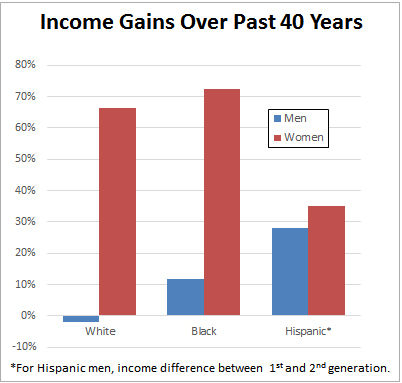Matt Yglesias says it’s ridiculous to attribute Donald Trump’s support to economic anxiety:
While plenty of people, including plenty of Trump fans, certainly have concerns about the economy, it’s racial resentment that drives who does and doesn’t support Trump….Adding an economic anxiety factor to your account doesn’t actually help to explain anything. Trump’s supporters, for example, are considerably whiter and considerably older than the American population at large. If the economic problems of the past decade had been unusually hard on the white and the old, then an economics-focused explanation could be valuable. In reality, things have been rougher on nonwhites and rougher on younger cohorts.
Generally speaking, I agree. There’s been an endless amount of research, including endless splicing and dicing of poll internals, that tries to explain what’s different about Trump supporters. And every time, the answer is pretty clear: racial resentment. This is so clear that it’s become a joke on Twitter. Every time  a Trump supporter (or Trump himself) does or says something racist, it will get linked with a snarky comment about the latest bit of “economic anxiety.”
a Trump supporter (or Trump himself) does or says something racist, it will get linked with a snarky comment about the latest bit of “economic anxiety.”
And yet, I do think that genuine economic anxiety has something to do with Trump’s popularity. The chart on the right, which I posted a couple of weeks ago, tells the basic story. Over the past few decades, women’s incomes have made great strides. Blacks have improved their economic position a bit. Hispanics too. The only group that’s failed to make any progress at all is white men. Maybe it’s not right to call this “anxiety,” but it’s certainly something that helps explain why white men are angrier than most people about their economic position.
Nor do I really buy this:
By contrast, the idea that Donald Trump is going to usher in a new era of broadly shared prosperity based on a revival of coal mining and labor-intensive methods of steel production is patently ridiculous. Under guise of being respectful of Trump voters’ concerns, pundits attributing his appeal to his economic “policies” are in effect attributing a remarkable degree of foolishness to his supporters. The more parsimonious and simple explanation is that there is a basic divide over values and cultural identity.
One of the remarkable things about presidential elections is the extent to which voters simply believe whatever candidates tell them. It doesn’t matter if it’s impossible. It doesn’t matter if the candidate changed his mind about this the day before yesterday. It doesn’t matter if there’s no plausible policy behind the claim. If Trump says he’s going to build a wall, then he’s going to build a wall. If he says he’s going to renegotiate all our trade treaties, then that’s what he’s going to do. This is not something specific to Trump fans. It’s true of all voters.
Personally, I find it sort of remarkable. But then, I’m basically half-Vulcan. Most people aren’t.
Presidential campaigns are mostly just an exercise in finding someone whose heart is in the right place. The fancy term is “mood affiliation.” Most voters don’t really care if either Trump or Hillary Clinton can do what they say. They just want to know what they consider important. Trump has very loudly signaled that he considers the plight of blue-collar workers important, both economically and culturally—and that’s really all that matters.
Now, there’s a metric buttload of racial and sexist angst wrapped up in that word “culturally.” Yglesias is right about that. But there really is an economic component too.
POSTSCRIPT: Of course, this whole argument might be moot. There’s considerable evidence that blue-collar whites don’t actually support Trump any more strongly than they’ve supported any other Republican candidate for president. Some of them may be louder than usual this year, but Trump doesn’t actually seem to have moved the needle much in terms of raw numbers.


















